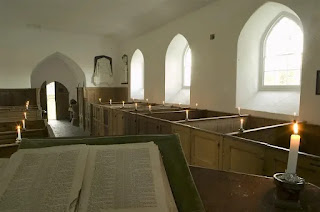'The care and protection of the ever-blessed Trinity': on The Grace at Matins and Evensong
In consequence of turning the words addressed by Paul to men, into an address to God, you was necessarily changed into us, and the word evermore was added.
That the Apostolic words are amended to become "an address to God" indicates that The Grace is indeed a prayer:
It is not strictly a Benediction, or blessing. It is rather an intercessionary prayer, wherein the priest implores a blessing for himself, as well as for the congregation. Though it is pronounced by the minister alone, the congregation ought mentally to address it to God. The church has made it, and calls it a prayer, and therefore the minister is directed to kneel.
There is some significance to this. Not concluding with a ministerial blessing emphasises the common nature of Morning and Evening Prayer, in which clergy and laity share: hence Shepherd encouraging the congregation to "mentally address" The Grace to God" as it is prayed by the minister. In a footnote, Shepherd points to the rubric before A Prayer for the King's Majesty:
Then these five Prayers following are to be read here ...
The Grace is the fifth of these prayers. It is part of common prayer for laity and clergy, not a ministerial blessing. (The addition of a ministerial blessing to Sunday Matins or Choral Evensong does not necessarily undermine this as the office itself concludes with the Grace. A ministerial blessing after subsequent hymn and sermon is, with these elements, an addition to Morning or Evening Prayer.)
Shepherd goes on to expound the Trinitarian nature of The Grace:
In this prayer, the minister commits himself and the people, to the care and protection of the ever-blessed Trinity, beseeching God, who is three persons in one nature, that the grace obtained by our Lord Jesus Christ in the redemption may absolve us, that the love of the Father, who is now reconciled through his blood, may justify us; and lastly, that by partaking of the communication of the Holy Ghost we may be sanctified.
It is a good example of what laudable Practice has elsewhere termed (albeit somewhat inelegantly) the 'Trinitarian minimalism' of Prayer Book and post-1662 Anglicanism: a focus on what is sufficient in Trinitarian doctrine, rather than curious speculations about the inner workings of the Holy Trinity. Such curious speculations too often harm and undermine Trinitarian faith, encouraging anti-Trinitarian critiques. The Grace, by contrast, concludes Morning and Evening Prayer by grounding us in a Trinitarian minimalism that provides a sufficient summary of faith in the Holy Trinity.
Shepherd then provides a further exposition of the Trinitarian nature of The Grace, regarding the prayer as grounded in the priestly benediction of Numbers, with its threefold invocation of the Divine Name:
Though the Apostle's Benediction is not literally copied from the Benediction ordained by God himself under the law (Numb. vi 23.) yet it virtually agrees with it. "On this wise shall ye bless the children of Israel, saying unto them, The Lord bless thee and keep thee: The Lord make his face to shine upon thee, and be gracious unto thee: The Lord lift up his countenance upon thee, and give thee peace." And this ancient form of benediction, in which the name of Jehovah is repeated three times, and in the Masoretic copies with a different accent each time, is by the Jews themselves supposed to contain a divine mystery. The pious Christian will without hesitation and with reverence acknowledge that it contains a direct allusion to the persons of the ever-blessed Trinity, to the Father, that he may bless and keep us; to the Son, that he may make his face to shine upon us, and be gracious to us; and to the Holy Ghost, that he may lift up the light of his countenance upon us, and give us peace both now and evermore.




Comments
Post a Comment